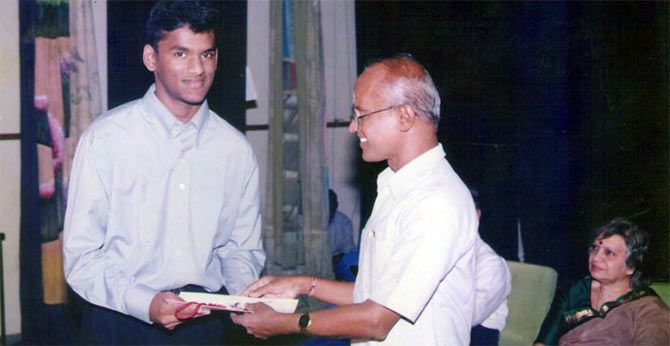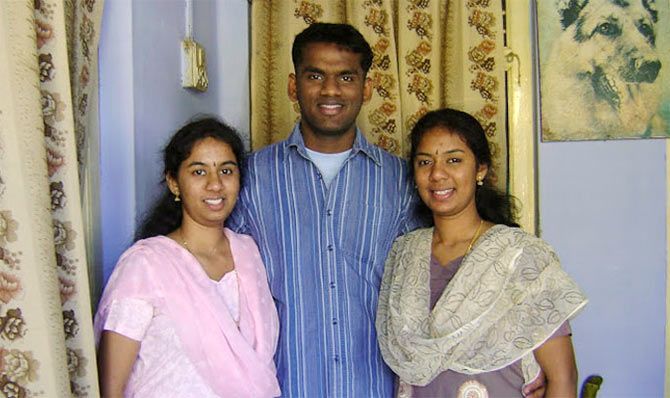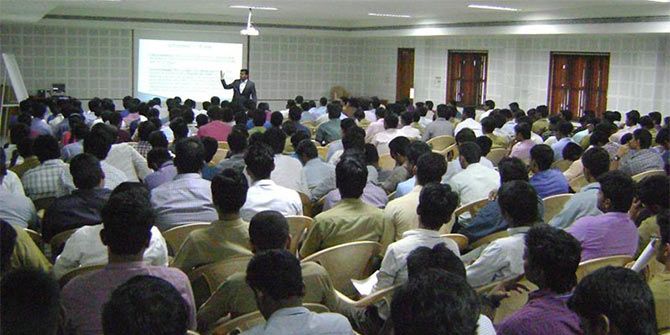
From Dindigul to Google and Chennai, this entrepreneur has travelled a full circle riding on English
Remember the Rapidex English Speaking Course? It was probably the only thick book in most households around the early 80s. We had one too. With three children studying in an English medium school and a husband who fussed about these things, my mother took refuge in the Rapidex to reach out to her family. Nearly all households have gone through this 'English Vinglish' moment sometime or the other.
The book, with editions in Hindi, Urdu, Bangla, Tamil, Gujarati and several other vernacular tongues, guided people to master the Queen's language in 30 days. Kept in the privacy of the bedroom, away from visitors' prying eyes, the Rapidex gained public acceptance only after cricketer Kapil Dev endorsed it.
The tryst with English language remains. According to unconfirmed estimates, the number of English-speaking people in India is expected to be somewhere around 10 per cent of its population, which is 125 million people. Thus, it is no surprise that Pustak Mahal, which publishes Rapidex, continues to make money on this bestseller even today.
"Whatever you say, the fact is that the primary reason people aren't able to convert their education into employability is because their English language skill is very poor. In fact, I would say this skill is more important than a degree. Coming from a small town myself, I can relate to their aspirations when they tell me they want to learn to speak English fluently," says Santhosh Karnananda, Founder and Director of MeraEnglish.com.
Walk the talk
While growing up in Dindigul, a small town near Madurai in Tamil Nadu, Santhosh would walk four kilometers every day to buy The Hindu with his pocket money because his parents would not indulge him, saying it was a waste of time and money to read English newspapers. "I am the first generation English speaker in my family. Though my parents are educated, they studied in Tamil medium. While I was studying in Dindigul, there was hardly anyone who read English beyond their course books."
Twenty-seven-year-old Santhosh, who taught himself communicative English primarily through newspapers, has today established himself as a professional trainer and entrepreneur through his website MeraEnglish. The website does not 'teach' you English; rather its focus is on providing the correct usage of words. For instance, you may either decide to 'denounce' the trend of English craze in India or you could 'renounce' your desire to learn the language. The website helps to identify the difference between such similar words and helps visitors grasp their nuances.
Santhosh has trained 40,000 people over 44 institutions primarily in Tamil Nadu. Through his MeraEnglish, a free to read website, MyGRE, and MyGMAT, he trains students and corporates in English usage, building English vocabulary, and communicative English. He has even authored a book, 'Learn 1000 words in 6 hours'.
Speak up

But the irony is while he was growing up in Dindigul he did not have anyone to converse with in English. "I don't know why, but I always held a fascination towards the English language. When I would attempt to talk to classmates and acquaintances in English, I would be laughed at," recalls Santhosh. If you are familiar with the small town milieu of Tamil Nadu, it will not come as a surprise that Santhosh was often referred to as 'Peter'. "This was the name given to anyone who tried to speak in English. People thought I was showing off."
What kept Santhosh going were the quiz competitions that he had begun to win for his school. "There was always the next competition to look forward to so I did not have much time to brood over the slights and comments made by people." In the ninth standard, he went on to lead the school and state in an inter-state quiz competition. "The more I won, the more I gained confidence. But having said that, spoken English was still a big problem," he says.
In Dindigul, those who studied in English medium school appeared for the CBSE examination in the 10th standard. After that, they would move over to the state board because, as Santhosh says, "It is easy to score. For those appearing for engineering or medicine, it was an unspoken rule to follow this trend. And it so happened that all my classmates went to the state board in a different school and I was the only one left behind in class XI in my school."
This turned out to be the most difficult part of Santhosh's life. "I still get nightmares recalling those days. But looking back, I feel I could do what I am doing today only because of those two years in my life. I was completely alone. There was no one with whom I could share the lesson plans or clear my doubts besides of course the teachers." This phase taught him self-reliance which came in handy when he decided to quit Google, and go solo.
Search leads to Google
Yes, Santhosh did achieve the feat of travelling from a lonely existence to the most connected place in the world, Google, riding merely on self-reliance and the burning passion to do something meaningful in his life.
But before Santhosh reached where he is today, he had to walk many a torturous paths. There was pressure from home to conform. To join the state board and try his luck to become an engineer or a doctor. "That is the period that strengthened my resolve to study English on my own. That's how when I decided to launch MeraEnglish, I did everything for my website, writing content, hiring people, and it was easy because of those two years that I spent on my own."
In 2002-2003, Internet had not reached places like Dindigul, and the only pastime for students was either play or read. Santhosh did both. He played hard and read voraciously. "I came across the mention of Loyola College in Chennai in 'India Today' magazine. I had always dreamt of going there. The only advice I got on how I could get an admission there was, 'study hard.'" Santhosh scored 85 per cent and secured a seat in Loyola College in Chennai.
From frying pan into fire

If you've ever experienced being out of the frying pan and into the fire, you'll know what Santhosh went through when he entered the portals of this famous college in a big city. "I thought I was alone in Dindigul, coming to Chennai made me feel even more isolated. Making friends became difficult. You had to be good in English to be accepted here. I started hanging around people I thought I could learn from. Because of my knowledge in current affairs, I was able to present a point of view which slowly made me gain acceptance. I started losing my inhibitions, and as people got to know me, I could express myself more. If one does anything repeatedly one improves. And that is what helped me when Google came to the campus," he says.
Santhosh joined Google as an Account Associate in 2007.
It was the biggest thing to happen to me. The mere fact that I was going to work at Google was enough for me. I did not contemplate much about my role.
Thus towards the end of the second year, Santhosh pondered on the most existential question that all of us confront sometime or the other -- what do I want from life? "I wanted to explore my potential."
One day while returning home from his morning gym session, Santhosh walked into a training class on a whim. It was a campus recruitment training class to coach students how to face interviews and appear for aptitude tests. "I had appeared for GMAT and GRE, and could relate to the students," he says. The institute offered him an opportunity to take a few classes. After quitting Google, Santhosh freelanced as a trainer for a year and a half. "Though I train people to think rationally, most of my decisions have been irrational."
Time, a good teacher

Santhosh found his calling in helping people like him achieve professional success. "I travelled extensively across Tamil Nadu and met thousands of young boys and girls like me who were struggling to come out of conformity." With his savings from Google, Santhosh was able to set up MeraEnglish website in 2012.
"When I started out I did not know how to make money. I only knew how to write content. It was only in 2013, that I started making money." Today, the MeraEnglish team has 11 trainers and writers with an office and classroom in Chennai.
Despite pressure from family, Santhosh has decided not to marry till he has established his business. "I took my first three-day break after three years when I went to Dindigul to visit my grandparents. My brain constantly thinks how to get the next client. Entrepreneurship is a full-time occupation. You cannot switch off. In 2013, I put on a lot of weight because I was not paying attention to my health or diet. It is relatively easy now, and I have started going to the gym."
Nonetheless, his entrepreneurial life has taught Santhosh to conquer his short temper. "I used to get angry very easily. I am much calmer now. This has been a huge learning. Despite all the uncertainties, I can handle so much and still have a good night's sleep and walk into the office the next morning with a smile on my face. Decision making has certainly become better. Initially, I would get fatigued. For some reason, decision making saps a lot of energy," he says.
In his training sessions, Santhosh guides students to follow their passion and make money too.
"I tell them to make irrational decisions. Sometimes the irrational part knows more than the rational part of the brain. But you should not leave it there. Perseverance is very important. I did not know it would take me this long to build. You should hang in there, because people trust you only after some time. As all entrepreneurs know, it gets easier with time."












